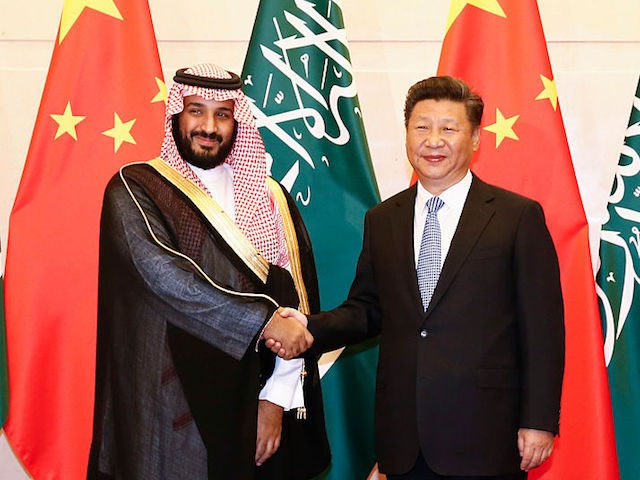Saudi Arabia’s Crown Prince Mohammed bin Salman has made the world a bold promise: under his watch, Riyadh will enter the 21st century.
Bin Salman (commonly referred to by his initials, MBS) has insisted his nation will remain a close ally of the United States and, judging from reports, has only used his recently created corruption commission against extremists within the ranks of government. “We will not waste 30 years of our lives in dealing with extremist ideas. We will destroy them today,” he vowed in remarks this October.
A month later, Saudi police have detained over 200 people – including key business leaders, government officials, and princes – for participating in “systematic corruption and embezzlement.” Reports have identified many of these as extremists with ties to the most hard-line clerics in the nation, however, the Saudi government does not identify those it arrests until after a trial takes place.
While the call to end decades of Sharia rule will inspire hope in Washington, President Donald Trump must not take for granted that Western-style classical liberalism will follow. When the arrests end, paving the way for a “moderate Islam,” Trump must be present to compel the Saudi government to create a free society – and prepared for the hard sell on “socialism with Chinese characteristics” from Beijing.
That danger appears acuter given the resemblance of MBS’s anti-corruption brigade to the Chinese Central Commission for Discipline Inspection, responsible for the arrests of thousands of Chinese officials for a variety of “crimes” ranging from hosting weddings considered too lavish for the Communist Party to accepting bribes from private industry. While the ends of both operations differ significantly – MBS appears to be seeking to diminish Wahhabist influences, while Xi Jinping clearly meant to cement his stranglehold on power – the means are uncannily similar. Washington must ensure those similarities end there.
Under Xi Jinping, the Chinese communist regime has endeavored to construct a coherent, totalitarian alternative to Western republican democracy and sell it to the world. Like everything else the Chinese government peddles on the international stage, its marketing is a cheap imitation of an American idea: the “Chinese Dream.”
During this year’s Communist Party of China (CPC) Congress – during which Xi immortalized himself in the party’s constitution – Xi asserted that the “Chinese dream” was the replacement of Western Marxism with an authoritarianism rooted in ancient Chinese imperialism and cultural supremacism: “socialism with Chinese characteristics.”
“Socialism with Chinese characteristics” is the cornerstone of “Xi Jinping thought,” which consists of unchallenged one-party rule, the eradication of cultural, linguistic, and religious diversity, and total government control over the individual’s daily life. Chinese officials have specifically called multi-party democracy a threat to its interests.
Week after week, Chinese state publications like Xinhua, the Global Times, the People’s Daily, and China Daily argue that Western democracy is in decline and has led the world into a state of “chaos,” while “socialism with Chinese characteristics” is the wave of the future.
“Crises and chaos swamp Western liberal democracy.” while “Chinese-style democracy has never been healthier and China has absolutely no need to import the failing party political systems of other countries,” Xinhua asserted in October.
The Soviet Union did not fail because communism is a doomed political system, but because Russia lacks “traditional Chinese culture,” the Global Times claimed last month. Last week, the publication claimed America “is faced with a spectrum of serious problems and its national governance is haphazard and scattershot.”
The Xi regime clearly seeks to impose Chinese authoritarianism on the West, arguing it is the only successful political system in the world and creating infrastructure to persuade more ignorant Americans to believe that – why else would Xi impose curricula in universities to make communism seem “cool,” then urge Trump to send as many Americans as possible to Chinese universities?
Its interests do not end there, however. The “socialism with Chinese characteristics” PR campaign also targets states mired in failed alternative systems, like sharia, seeking a way into modernity.
Beijing appears to have no interest in doing the hard work of supporting Saudi Arabia while it purges its jihadist elements. The Chinese Foreign Ministry has remained largely silent on the matter. The Global Times has, however, noted that King Salman “turned away from its tradition of being close to the US against Russia” by visiting Moscow. It does not mention China, but lauded attempts at reform as “well-intended.” The People’s Daily has praised Salman’s move to grant women the right to drive.
The Chinese appear to be slowly amassing goodwill and waiting for the storm in Riyadh to subside before making their sales pitch – just as they have in Afghanistan, Nigeria, and Brazil.
Xi already planted the seed in Saudi Arabia during his 2016 visit when he presented “the Chinese vision for the Middle East.”
Xi, Xinhua reported, “offers a fresh approach to the conflict-torn region’s thorny issues by highlighting dialogue and development as the core solution.” Blaming “Western intervention” for the region’s problems, Xinhua argues that what it needs most is “guaranteed political stability and dynamic economic growth.” Nothing guarantees “stability” more than totalitarianism.
The Trump administration is unquestionably siding with the Saudis now, through the hard times. Support without persuasion towards a Western system, however, will do nothing to liberalize Saudi Arabia. With no alternative to Islamism, the Saudis will choose “stability” over “chaos” – and Beijing will be waiting in the wings to sell it.

COMMENTS
Please let us know if you're having issues with commenting.